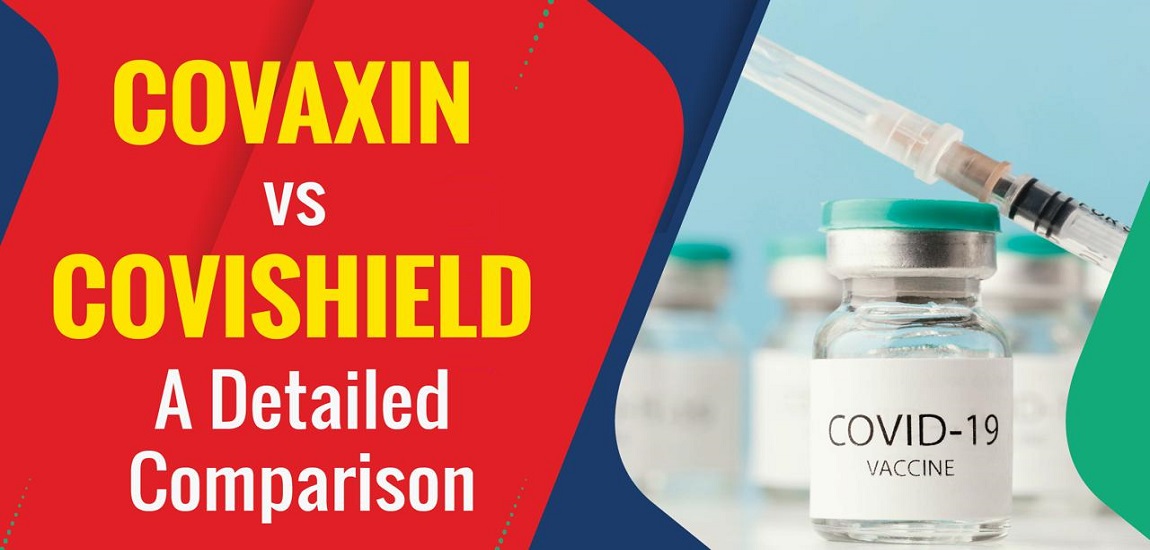
- By JRSH Admin
- In Health and Tips,
- Posted May 24, 2021
Covaxin vs Covishield – A Detailed Comparison
After the vaccination started in the world or India, all of us had the same question before being vaccinated: Which one is better? Which one works more effectively? Which one has side effects? Should we take the vaccine or not?
Undoubtedly getting vaccinated is one of the best ways to fight the pandemic. But, the government has not given India’s right to decide which vaccine they want to get, as the results suggest both the vaccines available in India work effectively and safely.
In this article, we explained all the questions raised related to vaccines to understand the importance of vaccines and everyone must take the vaccine to fight the coronavirus.
Covaxin vs Covishield – Which one is better?
There is no statement by the government or any other research team that Covaxin is better or Covishield is better. Both these vaccines have been developed similarly but we will compare both Covaxin vs Covishield by some theory.
There’s just one difference between the two of them. Covishield undergoes complete 3 stages of testing, whereas Covaxin, developed by Bharat Biotech remains on the last scale of study.
Two vaccines – Covishield (popularly known as Oxford-AstraZeneca make) and covaxin are self-made, and may be termed relatively safer than other modern vaccines, and carry a less than usual risk of side effects. Indian vaccines have good efficacy rates immediately, some clinical studies have stated.
Developers
Covaxin has been manufactured by Hyderabad-based Bharat Biotech International Ltd. (BB) with the association of the Indian Council of Medical Research (ICMR) and the National Institute of Virology (NIV).
The developer of the Covishield is the Oxford-AstraZeneca that is marketed in India and is being manufactured by the Serum Institute of India (SII).
How are they made?
Both of them (Covaxin and Covishield) are similar vaccines that can be produced by using inactive/modified forms of the virus.
Covishield may be a viral vector vaccine that uses an adenovirus that is found in Chimpanzees (ChAD0x1), to provide spike proteins and mount a tolerable immune response against a live virus.
On the contrary, Covaxin is additionally a traditionally made vaccine but uses an inactive viral strain. It can be made by the use of a deadly virus that drafts an immune response.
How does covaxin work?
On delivery of the covaxin to the body, the vaccine teaches the immune system to form antibodies against the SARS-CoV-2 coronavirus, consistent with the report of the New York Times. “The antibodies are connected to viral proteins, like the so-called spike proteins that stud its surface,” it added.
How does covishield work?
When a patient gets a dose of the vaccine, it stirs the immune system to begin producing antibodies against it and prepares it to attack any coronavirus infection.
Side-effects
It has been observed that minor side effects and disorders may appear at the time of post-vaccination.
Covishield Side-effects
Mild symptoms that can occur in the vase of covishield vaccine are:
- Headache
- Tenderness and pain at the site of injection
- Fatigue
- Myalgia (muscle pain)
- Malaise (Generalised weakness)
- Pyrexia (fever)
- Chills
- Arthralgia (joint pain)
- Nausea
Covaxin Side-effects
Mild symptoms that can occur in the vase of covaxin vaccine are:
- Swelling and pain at the area of injection
- Headache
- Fatigue
- Difficulty in breathing
- Mild or heavy Fever
- Body ache
- Abdominal pain
- Nausea and vomiting
- Dizziness-giddiness
- Sweating
- Cold and cough
- Tremors
Doses
Both the vaccines work as two-dose vaccines, meaning two doses are required for an individual to be fully vaccinated, given weeks apart. Covaxin’s second dose has to be given 4-6 weeks after the first one, Covishield’s second dose might be delayed, that is given 6-8 weeks after.
Who shouldn’t take Covaxin?
While people aren’t allowed to decide on the COVID vaccine, either in India or outside, those who have certain pre-existing conditions have been asked to consult a doctor’s advice before progressing.
Further studies have been shown that the dose of covaxin may be slightly unsafe for those people who might be having a fever at the time of vaccination, having on blood-thinning medications, affected by immune disorders, or any bleeding problems.
Who shouldn’t take Covishield?
As in the case of Covishield, people who have any pre-existing allergy should be very careful. And those on blood-thinning medications and those who are getting to conceive are also being advised to wait and take the doctor’s advice first.
People who recently had COVID-19 should also consider postponing their turn for vaccination by up to 3-4 weeks or 1 month as prescribed by the doctors.
How effective are they?
As considered by the observation from previous records, both the vaccines are found to be well-effective, meeting with WHO standards and bringing on certain immune responses.
Covishield, which ended trials in November 2020 has an efficacy rate of 70%, which can be further increased to 90% if the dosing is given half a dose, followed by a full dose a month later.
The protection and tolerability of vaccines have also been found to be well-suited and thought to lower the risk of symptomatic infections and speed up the recovery of the covid patients.
Covaxin completed its major trials by the end of February. Consistent with the good results and clinical analyses, the vaccine was found to have over 78% efficacy. Hence, there has also been clinical proof that gives the impression that Covaxin could lessen severity and mortality risk by an enormous 100 percent.
Pricing of the Vaccines
Recently the prices announced by COVID-19 vaccine manufacturers for state governments and private hospitals are “exorbitant” and therefore the Centre should cap costs to make vaccines more cost-effective.
Covishield, which is manufactured by the Pune-based Serum Institute of India (SII), is priced at INR 150 a dose for the Centre, INR 400 a dose for state governments, and INR 600 a dose for private hospitals.
The Hyderabad-based Bharat Biotech’s (BB) Covaxin is priced at INR 150 a dose for the Centre, INR 600 a dose for state governments, and INR 1,200 a dose for private hospitals.
Let’s take a look at the summary of the differences between covaxin vs covishield
|
Covishield |
Covaxin |
| Efficacy after fully vaccinated varies from 70% – 90% | Efficacy after fully vaccinated varies from 78% – 100% |
| People can get the vaccine above the age of 18. | People can get the vaccine above the age of 18. |
| The interval between the first and second dose of covishield is 12-16 weeks. | The interval between the first and second dose of covaxin is 4-6 weeks. |
| As for pricing, the covishield is less expensive. The government provides the vaccine for free but the SII is selling this vaccine at INR150 for the Centre, INR 400 for state governments, and INR 600 for private hospitals. | Covaxin is more expensive than Covishield and is being sold at INR 150 a dose for the Centre, INR 600 a dose for state governments, and INR 1,200 a dose for private hospitals by Bharat Biotech. |
| Covishield is easily available in India. | Covaxin is in limited stocks, fewer hospitals and healthcare centers have it. |
| Vaccines can be used under the supervision of the doctor. | Vaccines can be used under the supervision of the doctor. |
| Covishield has various side effects like headache, fatigue, nausea, mild fever, muscle pain, weakness, etc. | Covaxin has various side effects like cold, headache, mild fever, fatigue, body ache, abdominal pain, nausea, vomiting, etc. |
Conclusion:
From all the information given above, it can be understood that the vaccine is very important for every person. Covaxin vs Covishield both are the right vaccines, so there is no need to choose between them, whatever is provided by the government in your city you can take them.
The government provided the vaccine free of cost so that every person will get vaccinated. We requested everyone to get vaccinated as soon as possible to fight the pandemic.
The second wave of the pandemic is huge, so vaccination is important for everyone above the age of 18. The government now allowed 18+ people to get vaccinated. So, get vaccination fast.
Tags
Blog Search
Latest Posts
-
Ear Infections (Otitis Media): Top Triggers & How to Avoid Them?
April 11, 2025 -
Implantation Bleeding Vs Periods: Know the Difference
March 12, 2025 -
5 Tips for a Happy and Healthy Summer
February 27, 2025 -
Body Ache (Pain): Causes, Symptoms and Treatment Options
February 10, 2025 -
Fatigue and Exhaustion: Causes, Symptoms, and Treatment
January 08, 2025




